News
Neil Gorsuch's Answers On Roe v. Wade Aren't Very Clear

Given the fact that President Trump promised to appoint Supreme Court justices who would overturn Roe v. Wade multiple times during his campaign, his nominee's answers on the matter were some of the most anticipated from his confirmation hearing. Judge Neil Gorsuch omitted his personal views on Roe v. Wade in his response to questions about the case. Instead, the judge went with by-the-book answers vowing to honor Roe's status as a precedent when considering the landmark decision.
When asked by Sen. Chuck Grassley if he believed Roe was decided correctly, Gorsuch stated:
Senator, again I would tell you that Roe v. Wade, decided in 1973, is a precedent of the United States Supreme Court. It has been reaffirmed; the reliance interests considerations are important there, and all of the other factors that go into analyzing precedent have to be considered. It is a precedent of the United States Supreme Court. It was reaffirmed in Casey in 1992 and in several other cases. So a good judge will consider it as precedent of the United States Supreme Court worthy of treatment of precedent like any other.
Sen. Dianne Feinstein pointed out the president's statements on his plans to choose a justice who would overturn the decision granting women legal access to abortion and asked Gorsuch to elaborate on his belief regarding the importance of precedent. The judge went on to insist that precedent holds intrinsic value as our history and as a concept that adds "determinacy to the law," which allows the country to "move forward" and turning divisive issues into "no longer hotly contested issues."
Sen. Lindsey Graham explicitly asked Gorsuch if President Trump had questioned him on whether he would vote to overturn Roe v. Wade during his interview, to which the judge responded, "Senator, I would have walked out the door."
Very little is known about Gorsuch's personal views on abortion, but his opinions on personhood and a recent attempt to challenge Planned Parenthood have raised some red flags for pro-choice advocates.
In his book The Future of Assisted Suicide and Euthanasia, Gorsuch argued against legal euthanasia with the statement "human life is fundamentally and inherently valuable, and the taking of human life by private persons is always wrong." In one chapter dedicated to analyzing Planned Parenthood v. Casey and Cruzan v. Director, Missouri Department of Health, he wrote, “Abortion would be ruled out by the inviolability-of-life principle I intend to set forth if, but only if, a fetus is considered a human life.” While he went on to acknowledge that a fetus is not considered a person according to the Roe Supreme Court decision, he himself appeared to hold that view in another section of the book, where he wrote that “arguing that the right to terminate a pregnancy differs from the right to use contraceptives because the former involves the death of a person while the latter does not.”
“I decide cases, not political issues," Gorsuch said on Tuesday during his hearing. While he's correct, his answers to questions on Roe v. Wade are lacking in transparency, and given the president's investment in overturning the 1973 decision, Gorsuch should be more forthcoming to assert his independence from the current administration.